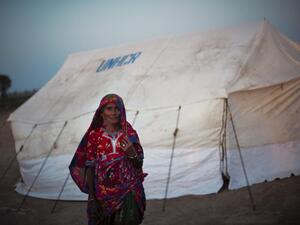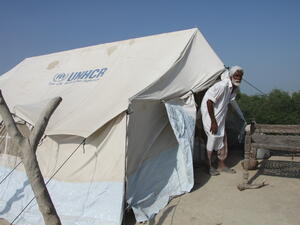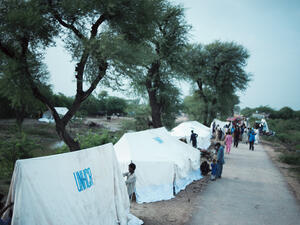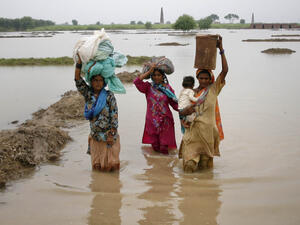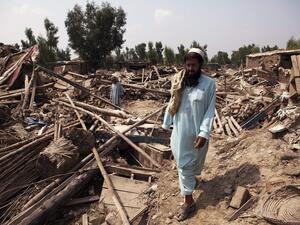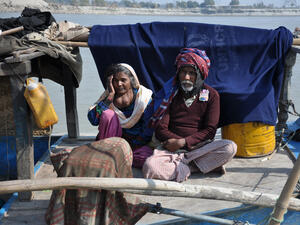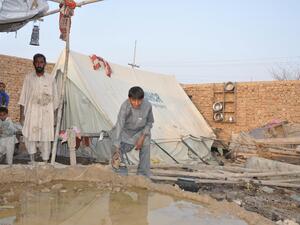Delays in heeding flood warnings ends in tragedy for some Sindh families
Delays in heeding flood warnings ends in tragedy for some Sindh families
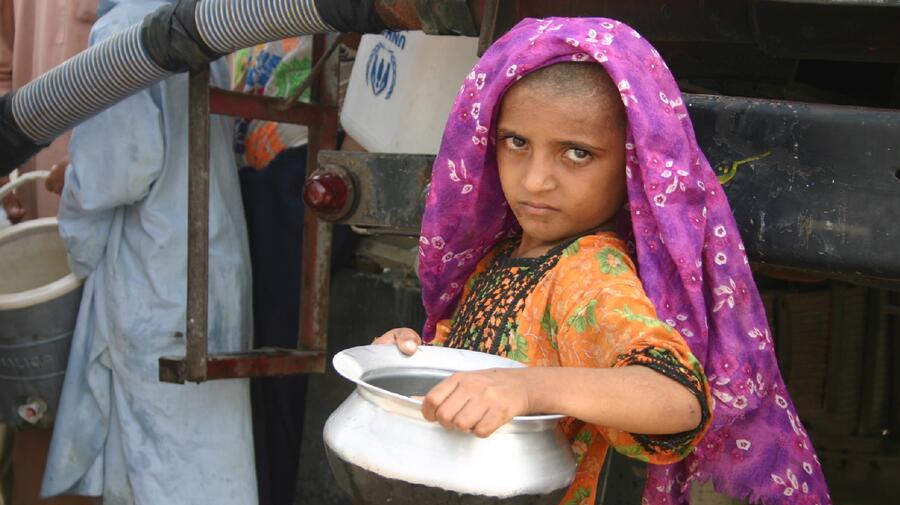
A young girl waits for water for her family at a relief camp in Sukkur district.
SUKKUR, Pakistan, September 1 (UNHCR) - Imam and Ghulam are bitterly ruing their decision to ignore flood warnings until the last minute in the vain hope that the swirling waters would leave their humble home in southern Pakistan alone. It cost them their belongings and left one son dead and another missing.
The tenant farmers are among tens of thousands of mostly poor people who have sought shelter in Sukkur District after fleeing from other flooded areas of Sindh province. Most have also lost everything and face a tough struggle to rebuild their already harsh lives. And, like Imam and Ghulam, some ignored early warnings to move to higher ground.
"We were sleeping. It was in the dead of night when flash floods hit our area. We could feel and see water everywhere," recalled a weeping Imam, who lived with Ghulam and their seven children near the town of Jacobabad, which has been inundated by floodwaters heading south.
"The floods took away everything: my home, my five-year-old son Naik Mohammad and Irfan, 13, who is missing and might be alive," the 45-year-old told UNHCR staff at a relief camp in Sukkur. The survivors walked for two hours before flagging down a truck and getting a lift to safety.
The family could not have stopped the floodwaters, but they could have escaped earlier and with some of their belongings if they had listened to warnings, as Imam urged her husband to do.
"Some people started leaving before the flooding, but my husband was making fun of me as he had been told by our landlord that the waters could not reach this area," Imam explained. "Now my husband is repenting his decision to not leave in time."
To some extent, the family was a victim of the conservative culture and traditions of the tenant farmers of the region. These have inhibited contact with strangers and included overwhelming respect for the authority and advice of their landlords. This helps explain why they - and others - ignored the danger signs when others were moving to safety.
Imam, Ghulam and the five of their children who made it out safely are now staying at a camp set up by the Pakistan air force, where the UN refugee agency has distributed relief items to new arrivals, most of whom come from the heavily flooded Jacobabad area to the west of the Indus River.
Imam and her family have now been living in a tent in Sukkur for three weeks and she said they faced many problems, including scorching heat, lack of clothing and a shortage of clean, potable water. There are only 25 latrines for a population of 3,000 displaced people.
Moreover, it is the Islamic fasting month of Ramadan, which means they cannot eat until sundown. "These are the worst days of our life," Imam moaned.
Gula also lost relatives when the floodwaters swept through her home in the Jacobabad community during the night. "We were screaming as the water swept away my younger sister and my aunt," she said in the Sukkur camp. The adults had to wade chest deep to safety, carrying children on their shoulders.
"Everything was destroyed and we arrived here with just the clothes on our back," added Gula. But her husband, tenant farmer Imam Din, also ignored early flood warnings after his landlord told him the area would not be flooded.
With floodwaters staring to recede, both families are keen to get back to their homes as soon as possible and Imam hopes she will find her missing son safe and sound.
UNHCR has been distributing tents and other relief items to people staying in camps and other spontaneous sites in Shikarpur, Khairpur, Kashmore, Nowshero Feroz, Sukkur and Jacobabad districts in the northern part of Sindh.
In Sindh, the refugee agency is distributing shelter supplies as well as providing technical assistance to local officials in the coordination and management of camps. So far, some 2,400 camps or spontaneous sites have sprung up in Sindh where flood-affected people are seeking refuge.
By Qaiser Khan Afridi in Sukkur, Pakistan

